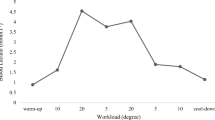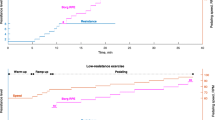Abstract
We hypothesized that fatigue due to hyperthermia during prolonged exercise in the heat is in part related to alterations in frontal cortical brain activity. The electroencephalographic activity (EEG) of the frontal cortex of the brain was measured in seven cyclists [maximal O2 uptake (V̇O 2 max) 4.8±0.1 (SE) l min–1] cycling at 60% V̇O 2 max in a hot (H, 42°C) and a cool (C, 19°C) environment. Fast Fourier transformation of the EEG was used to obtain power spectrum areas in the α (8–13 Hz) and β (13–30 Hz) frequencies. The ratio α/β was calculated as an index of arousal level; an elevated α/β index reflects suppressed arousal. In H, subjects fatigued after 34.4±1.4 min coinciding with an oesophageal temperature (T oes) of 39.8±0.1°C, an almost maximal heart rate (HR 192±3 beats·min–1), a rating of perceived exertion (RPE) of 19.0±0.8 and significantly elevated α/β index (188±71% of the value after 2 min of exercise; P<0.05). In C, subjects cycled for a similar period while T oes was below 38°C, HR and RPE were low, and the α/β index was not significantly elevated (59±27% of 2 min value; P=NS). Increases in the α/β index were strongly correlated to increases in T oes (r 2=0.98; P=0.0001).
Similar content being viewed by others
Author information
Authors and Affiliations
Additional information
Received after revision: 3 November 2000
Electronic Publication
Rights and permissions
About this article
Cite this article
Nielsen, B., Hyldig, T., Bidstrup, F. et al. Brain activity and fatigue during prolonged exercise in the heat. Pflügers Arch - Eur J Physiol 442, 41–48 (2001). https://doi.org/10.1007/s004240100515
Received:
Accepted:
Published:
Issue Date:
DOI: https://doi.org/10.1007/s004240100515




